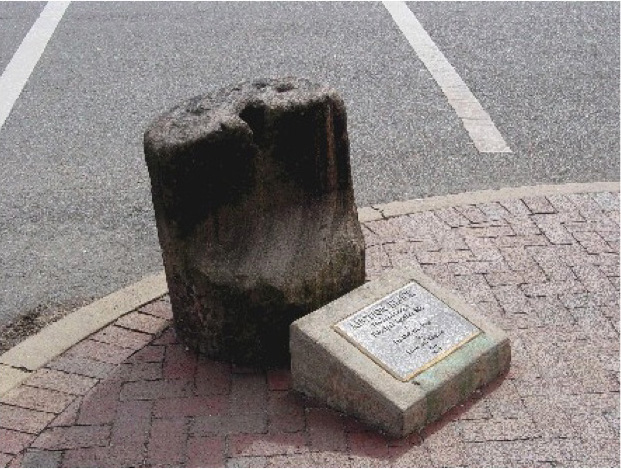Saving History Saturday: Fredericksburg, Virginia to Move Slave Auction Block
 On Tuesday, June 11, the Fredericksburg City Council voted 6 to 1 to remove and relocate the city’s well-known slave auction block.
On Tuesday, June 11, the Fredericksburg City Council voted 6 to 1 to remove and relocate the city’s well-known slave auction block.
Located at the corner of William and Charles Streets in downtown Fredericksburg, the block has been the source of controversy for quite some time. Perched in front of the block is a bronze plaque, which reads: “AUCTION BLOCK, Fredericksburg’s Principal Auction Site in Pre-Civil War Days for Slaves and Property.”

In 2017, Chief Historian at Fredericksburg & Spotsylvania National Military Park John Hennessy wrote an article about the history of the block, stating “The shaped block of stone sits at the corner of Charles and William Street in Fredericksburg, directly in front of the building that was once the Planter’s Hotel. Over the years it has been backed into by trucks and hacked at by vandals. Mostly, until recently, it has been unnoticed. But to some people it is one of the most compelling urban artifacts in America–a site of conscience, one of those places that requires us to recall past failures, injustice, and, in this instance, the struggles of people to overcome and ultimately reverse them.”
According to the city’s official website, the City Council wished to create a larger conversation among residents about their contentious history. They wrote, “The community dialogue began, and it should continue, with leadership from the local religious community, business community, historians, academic institutions, and the local Black community and institutions. City Council members wish to support this larger conversation and to participate in it.”
Some members of the community agreed with the Fredericksburg City Council’s decision. Over two thousand people signed a petition, stating “the auction block serves only to represent oppression and racism. We, as a modern society, have had enough of this stone symbol of bigotry; let us have it removed from our beautiful downtown neighborhood. Display it in a museum if you wish, but this vile monument does not belong on a public street corner as a constant reminder of the hatred that once filled this town, state, and nation which we call our home.”
To others, the slave block should remain where it is and kept within its original context. City Councilman Matt Kelly felt that, “We need to sometimes feel shock, pain and remorse to know how far we’ve come, what has been done, what has been sacrificed.”
Many use the block as a teaching tool. Tour guide and historian Jervis Hairston, who gives tours of downtown Fredericksburg, stated, “there’s probably some benefit of having these types of places so that people can hear the story, understand the story and never repeat the story, but it’s just as important if you can remove pain and sadness by placing it in a museum.”
The Fredericksburg Area Museum will be the new home of the block “by the end of the calendar year.” The museum is currently developing its interpretive and exhibition plans for the slave block.
For More Information:
To read the official statements by the Fredericksburg City Council, please visit: https://www.fredericksburgva.gov/1287/Slave-Auction-Block
NBC Washington examined the issue in Fredericksburg in this article on June 12, 2019.
Interestingly, the opposite is occurring in New Orleans. Former sites of slave-auctions are getting plaques so that people know where they are. Sometimes it is to a silly degree. One simply says the people who lived there owned slaves, although no sales were made.
People want history to be sanitized and Disneyfied, so that it has no past or present reality. Keep the monuments, and put more up. It is the height of arrogance to believe that you as a single person, gender or race own all memories and truth.
what a shame another piece of history being removed for all the wrong reasons . no matter how hard you try you can not change history but you can learn from it only if you want to . so childish and thin skinned some have become. certainly not historians and not true Americans when freedom is taken away because your feeling are hurt . grow up.
There are no easy answers on these things. The question always is whether the monument/item/artifact is presented as a symbol honoring what it stood for/was used for or is it simply history – good or bad. If it’s the former it ought to be removed. If it’s the latter it should remain and can be accompanied by something disavowing any symbolism. This should all be done without any hidden agendas. And there are agendas on both sides of this debate, although one is almost never conceded. As for this particular artifact, John Hennessy’s statement seems to suggest a practical reason for moving it, not involving either side of the debate. .